Examining the Ethical Issues in Assisted Dying: A Philosophical View
VerifiedAdded on 2023/06/11
|7
|1635
|289
Essay
AI Summary
This essay provides a comprehensive analysis of the ethical issues surrounding assisted dying, drawing upon four different articles to explore various perspectives. It examines the ethical dilemma of truth-telling to terminally ill patients, balancing the need to instill hope with respecting patient autonomy. The essay also delves into cultural and religious considerations in pediatric palliative care, highlighting the importance of culturally sensitive and competent care. Furthermore, it discusses the communication between healthcare providers and patients regarding prognosis in advanced life-limiting illnesses, emphasizing the need for appropriate care, treatment, and support. The conclusion underscores the importance of respecting patient rights to information while providing unwavering support and care, irrespective of the severity of their condition. Desklib offers a wealth of similar academic resources for students.

Running Head: Ethical Issues in Assistant Dying
Ethical Issues in Assistant Dying
Ethical Issues in Assistant Dying
Paraphrase This Document
Need a fresh take? Get an instant paraphrase of this document with our AI Paraphraser
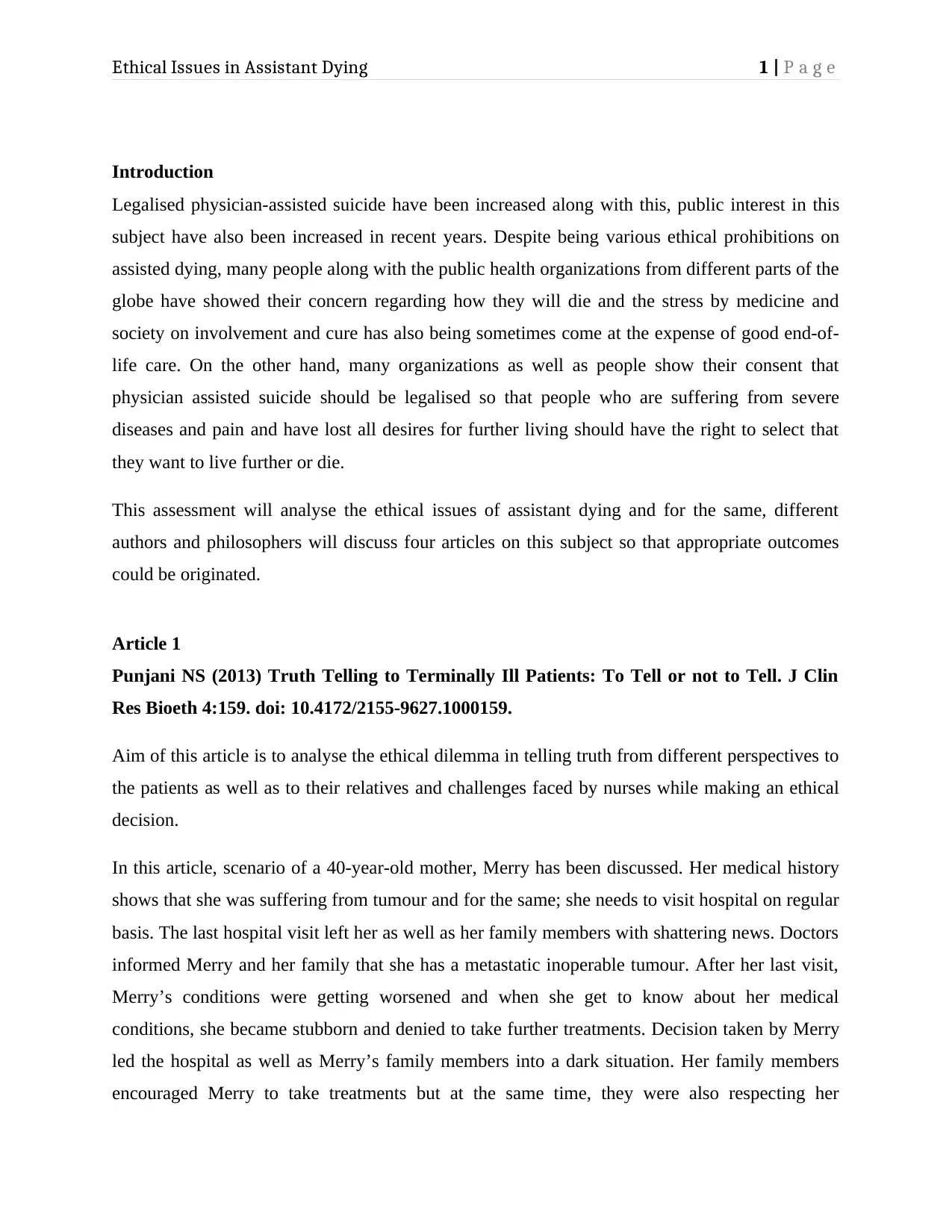
Ethical Issues in Assistant Dying 1 | P a g e
Introduction
Legalised physician-assisted suicide have been increased along with this, public interest in this
subject have also been increased in recent years. Despite being various ethical prohibitions on
assisted dying, many people along with the public health organizations from different parts of the
globe have showed their concern regarding how they will die and the stress by medicine and
society on involvement and cure has also being sometimes come at the expense of good end-of-
life care. On the other hand, many organizations as well as people show their consent that
physician assisted suicide should be legalised so that people who are suffering from severe
diseases and pain and have lost all desires for further living should have the right to select that
they want to live further or die.
This assessment will analyse the ethical issues of assistant dying and for the same, different
authors and philosophers will discuss four articles on this subject so that appropriate outcomes
could be originated.
Article 1
Punjani NS (2013) Truth Telling to Terminally Ill Patients: To Tell or not to Tell. J Clin
Res Bioeth 4:159. doi: 10.4172/2155-9627.1000159.
Aim of this article is to analyse the ethical dilemma in telling truth from different perspectives to
the patients as well as to their relatives and challenges faced by nurses while making an ethical
decision.
In this article, scenario of a 40-year-old mother, Merry has been discussed. Her medical history
shows that she was suffering from tumour and for the same; she needs to visit hospital on regular
basis. The last hospital visit left her as well as her family members with shattering news. Doctors
informed Merry and her family that she has a metastatic inoperable tumour. After her last visit,
Merry’s conditions were getting worsened and when she get to know about her medical
conditions, she became stubborn and denied to take further treatments. Decision taken by Merry
led the hospital as well as Merry’s family members into a dark situation. Her family members
encouraged Merry to take treatments but at the same time, they were also respecting her
Introduction
Legalised physician-assisted suicide have been increased along with this, public interest in this
subject have also been increased in recent years. Despite being various ethical prohibitions on
assisted dying, many people along with the public health organizations from different parts of the
globe have showed their concern regarding how they will die and the stress by medicine and
society on involvement and cure has also being sometimes come at the expense of good end-of-
life care. On the other hand, many organizations as well as people show their consent that
physician assisted suicide should be legalised so that people who are suffering from severe
diseases and pain and have lost all desires for further living should have the right to select that
they want to live further or die.
This assessment will analyse the ethical issues of assistant dying and for the same, different
authors and philosophers will discuss four articles on this subject so that appropriate outcomes
could be originated.
Article 1
Punjani NS (2013) Truth Telling to Terminally Ill Patients: To Tell or not to Tell. J Clin
Res Bioeth 4:159. doi: 10.4172/2155-9627.1000159.
Aim of this article is to analyse the ethical dilemma in telling truth from different perspectives to
the patients as well as to their relatives and challenges faced by nurses while making an ethical
decision.
In this article, scenario of a 40-year-old mother, Merry has been discussed. Her medical history
shows that she was suffering from tumour and for the same; she needs to visit hospital on regular
basis. The last hospital visit left her as well as her family members with shattering news. Doctors
informed Merry and her family that she has a metastatic inoperable tumour. After her last visit,
Merry’s conditions were getting worsened and when she get to know about her medical
conditions, she became stubborn and denied to take further treatments. Decision taken by Merry
led the hospital as well as Merry’s family members into a dark situation. Her family members
encouraged Merry to take treatments but at the same time, they were also respecting her
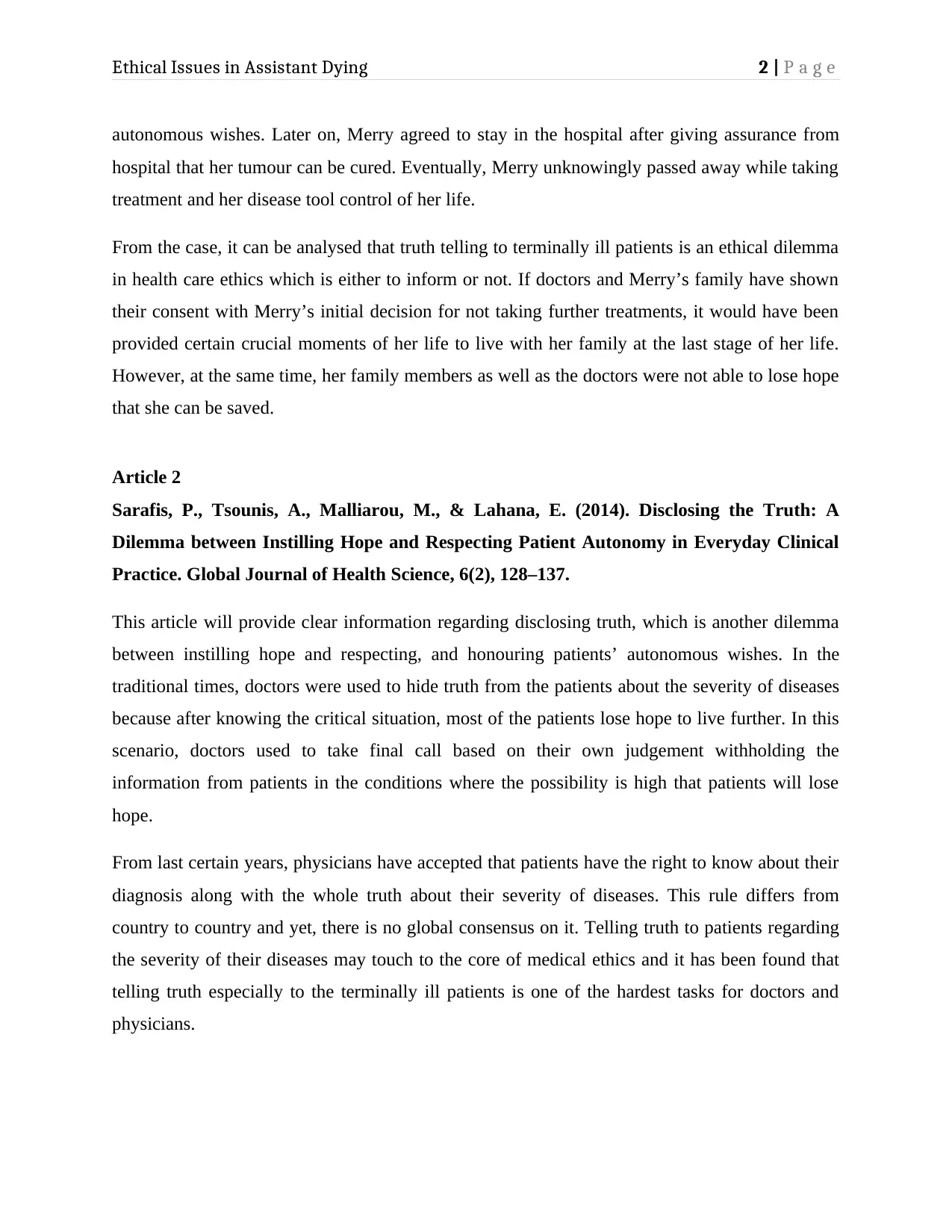
Ethical Issues in Assistant Dying 2 | P a g e
autonomous wishes. Later on, Merry agreed to stay in the hospital after giving assurance from
hospital that her tumour can be cured. Eventually, Merry unknowingly passed away while taking
treatment and her disease tool control of her life.
From the case, it can be analysed that truth telling to terminally ill patients is an ethical dilemma
in health care ethics which is either to inform or not. If doctors and Merry’s family have shown
their consent with Merry’s initial decision for not taking further treatments, it would have been
provided certain crucial moments of her life to live with her family at the last stage of her life.
However, at the same time, her family members as well as the doctors were not able to lose hope
that she can be saved.
Article 2
Sarafis, P., Tsounis, A., Malliarou, M., & Lahana, E. (2014). Disclosing the Truth: A
Dilemma between Instilling Hope and Respecting Patient Autonomy in Everyday Clinical
Practice. Global Journal of Health Science, 6(2), 128–137.
This article will provide clear information regarding disclosing truth, which is another dilemma
between instilling hope and respecting, and honouring patients’ autonomous wishes. In the
traditional times, doctors were used to hide truth from the patients about the severity of diseases
because after knowing the critical situation, most of the patients lose hope to live further. In this
scenario, doctors used to take final call based on their own judgement withholding the
information from patients in the conditions where the possibility is high that patients will lose
hope.
From last certain years, physicians have accepted that patients have the right to know about their
diagnosis along with the whole truth about their severity of diseases. This rule differs from
country to country and yet, there is no global consensus on it. Telling truth to patients regarding
the severity of their diseases may touch to the core of medical ethics and it has been found that
telling truth especially to the terminally ill patients is one of the hardest tasks for doctors and
physicians.
autonomous wishes. Later on, Merry agreed to stay in the hospital after giving assurance from
hospital that her tumour can be cured. Eventually, Merry unknowingly passed away while taking
treatment and her disease tool control of her life.
From the case, it can be analysed that truth telling to terminally ill patients is an ethical dilemma
in health care ethics which is either to inform or not. If doctors and Merry’s family have shown
their consent with Merry’s initial decision for not taking further treatments, it would have been
provided certain crucial moments of her life to live with her family at the last stage of her life.
However, at the same time, her family members as well as the doctors were not able to lose hope
that she can be saved.
Article 2
Sarafis, P., Tsounis, A., Malliarou, M., & Lahana, E. (2014). Disclosing the Truth: A
Dilemma between Instilling Hope and Respecting Patient Autonomy in Everyday Clinical
Practice. Global Journal of Health Science, 6(2), 128–137.
This article will provide clear information regarding disclosing truth, which is another dilemma
between instilling hope and respecting, and honouring patients’ autonomous wishes. In the
traditional times, doctors were used to hide truth from the patients about the severity of diseases
because after knowing the critical situation, most of the patients lose hope to live further. In this
scenario, doctors used to take final call based on their own judgement withholding the
information from patients in the conditions where the possibility is high that patients will lose
hope.
From last certain years, physicians have accepted that patients have the right to know about their
diagnosis along with the whole truth about their severity of diseases. This rule differs from
country to country and yet, there is no global consensus on it. Telling truth to patients regarding
the severity of their diseases may touch to the core of medical ethics and it has been found that
telling truth especially to the terminally ill patients is one of the hardest tasks for doctors and
physicians.
⊘ This is a preview!⊘
Do you want full access?
Subscribe today to unlock all pages.

Trusted by 1+ million students worldwide
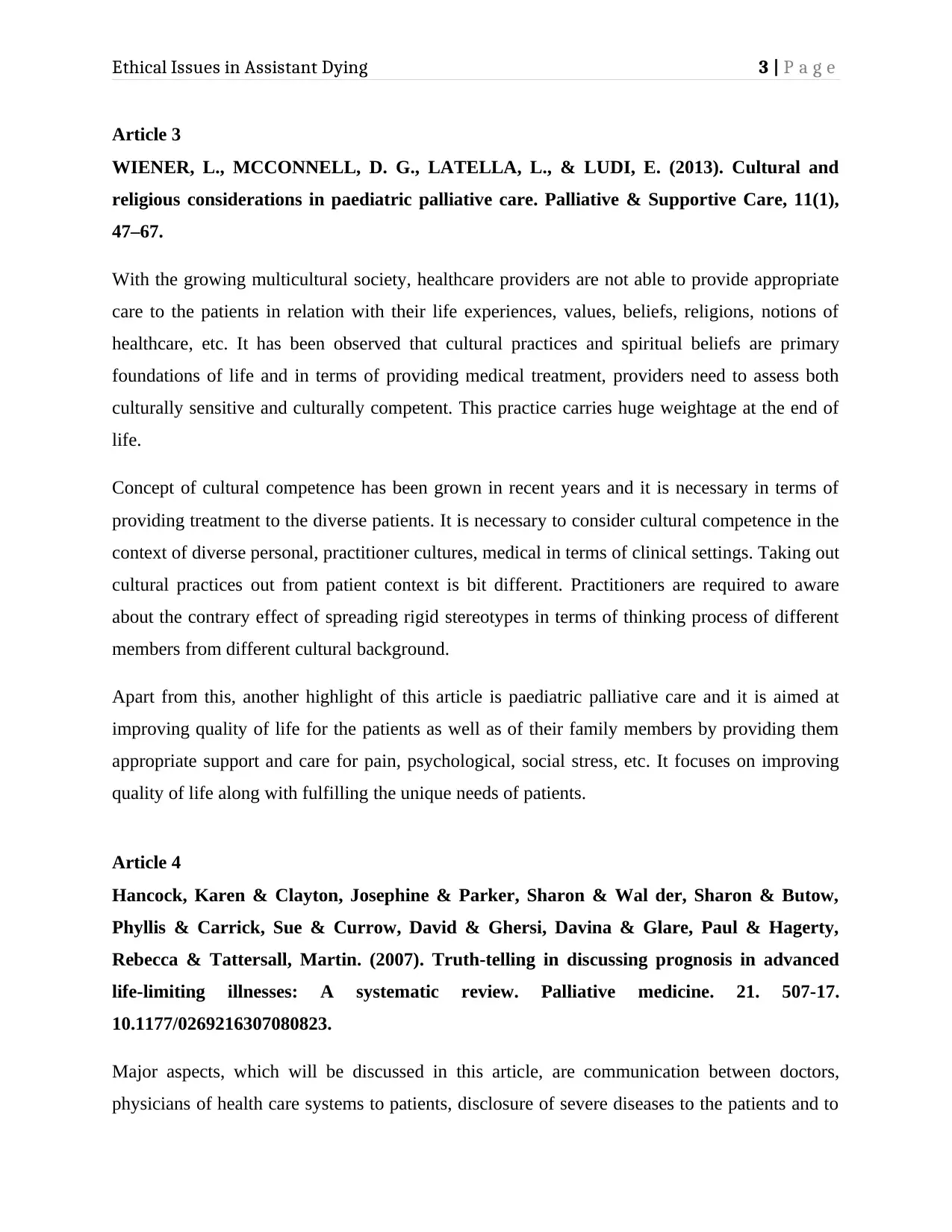
Ethical Issues in Assistant Dying 3 | P a g e
Article 3
WIENER, L., MCCONNELL, D. G., LATELLA, L., & LUDI, E. (2013). Cultural and
religious considerations in paediatric palliative care. Palliative & Supportive Care, 11(1),
47–67.
With the growing multicultural society, healthcare providers are not able to provide appropriate
care to the patients in relation with their life experiences, values, beliefs, religions, notions of
healthcare, etc. It has been observed that cultural practices and spiritual beliefs are primary
foundations of life and in terms of providing medical treatment, providers need to assess both
culturally sensitive and culturally competent. This practice carries huge weightage at the end of
life.
Concept of cultural competence has been grown in recent years and it is necessary in terms of
providing treatment to the diverse patients. It is necessary to consider cultural competence in the
context of diverse personal, practitioner cultures, medical in terms of clinical settings. Taking out
cultural practices out from patient context is bit different. Practitioners are required to aware
about the contrary effect of spreading rigid stereotypes in terms of thinking process of different
members from different cultural background.
Apart from this, another highlight of this article is paediatric palliative care and it is aimed at
improving quality of life for the patients as well as of their family members by providing them
appropriate support and care for pain, psychological, social stress, etc. It focuses on improving
quality of life along with fulfilling the unique needs of patients.
Article 4
Hancock, Karen & Clayton, Josephine & Parker, Sharon & Wal der, Sharon & Butow,
Phyllis & Carrick, Sue & Currow, David & Ghersi, Davina & Glare, Paul & Hagerty,
Rebecca & Tattersall, Martin. (2007). Truth-telling in discussing prognosis in advanced
life-limiting illnesses: A systematic review. Palliative medicine. 21. 507-17.
10.1177/0269216307080823.
Major aspects, which will be discussed in this article, are communication between doctors,
physicians of health care systems to patients, disclosure of severe diseases to the patients and to
Article 3
WIENER, L., MCCONNELL, D. G., LATELLA, L., & LUDI, E. (2013). Cultural and
religious considerations in paediatric palliative care. Palliative & Supportive Care, 11(1),
47–67.
With the growing multicultural society, healthcare providers are not able to provide appropriate
care to the patients in relation with their life experiences, values, beliefs, religions, notions of
healthcare, etc. It has been observed that cultural practices and spiritual beliefs are primary
foundations of life and in terms of providing medical treatment, providers need to assess both
culturally sensitive and culturally competent. This practice carries huge weightage at the end of
life.
Concept of cultural competence has been grown in recent years and it is necessary in terms of
providing treatment to the diverse patients. It is necessary to consider cultural competence in the
context of diverse personal, practitioner cultures, medical in terms of clinical settings. Taking out
cultural practices out from patient context is bit different. Practitioners are required to aware
about the contrary effect of spreading rigid stereotypes in terms of thinking process of different
members from different cultural background.
Apart from this, another highlight of this article is paediatric palliative care and it is aimed at
improving quality of life for the patients as well as of their family members by providing them
appropriate support and care for pain, psychological, social stress, etc. It focuses on improving
quality of life along with fulfilling the unique needs of patients.
Article 4
Hancock, Karen & Clayton, Josephine & Parker, Sharon & Wal der, Sharon & Butow,
Phyllis & Carrick, Sue & Currow, David & Ghersi, Davina & Glare, Paul & Hagerty,
Rebecca & Tattersall, Martin. (2007). Truth-telling in discussing prognosis in advanced
life-limiting illnesses: A systematic review. Palliative medicine. 21. 507-17.
10.1177/0269216307080823.
Major aspects, which will be discussed in this article, are communication between doctors,
physicians of health care systems to patients, disclosure of severe diseases to the patients and to
Paraphrase This Document
Need a fresh take? Get an instant paraphrase of this document with our AI Paraphraser
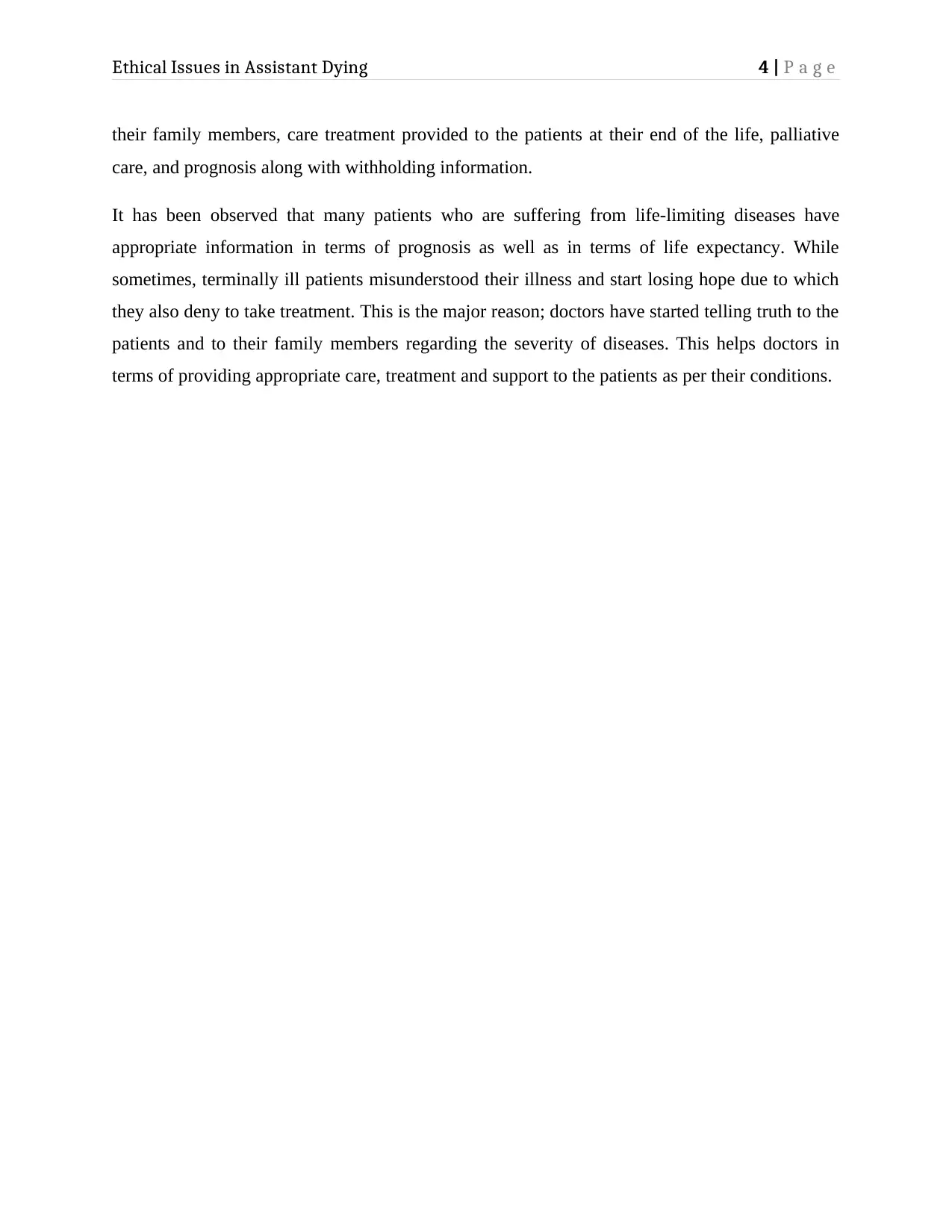
Ethical Issues in Assistant Dying 4 | P a g e
their family members, care treatment provided to the patients at their end of the life, palliative
care, and prognosis along with withholding information.
It has been observed that many patients who are suffering from life-limiting diseases have
appropriate information in terms of prognosis as well as in terms of life expectancy. While
sometimes, terminally ill patients misunderstood their illness and start losing hope due to which
they also deny to take treatment. This is the major reason; doctors have started telling truth to the
patients and to their family members regarding the severity of diseases. This helps doctors in
terms of providing appropriate care, treatment and support to the patients as per their conditions.
their family members, care treatment provided to the patients at their end of the life, palliative
care, and prognosis along with withholding information.
It has been observed that many patients who are suffering from life-limiting diseases have
appropriate information in terms of prognosis as well as in terms of life expectancy. While
sometimes, terminally ill patients misunderstood their illness and start losing hope due to which
they also deny to take treatment. This is the major reason; doctors have started telling truth to the
patients and to their family members regarding the severity of diseases. This helps doctors in
terms of providing appropriate care, treatment and support to the patients as per their conditions.
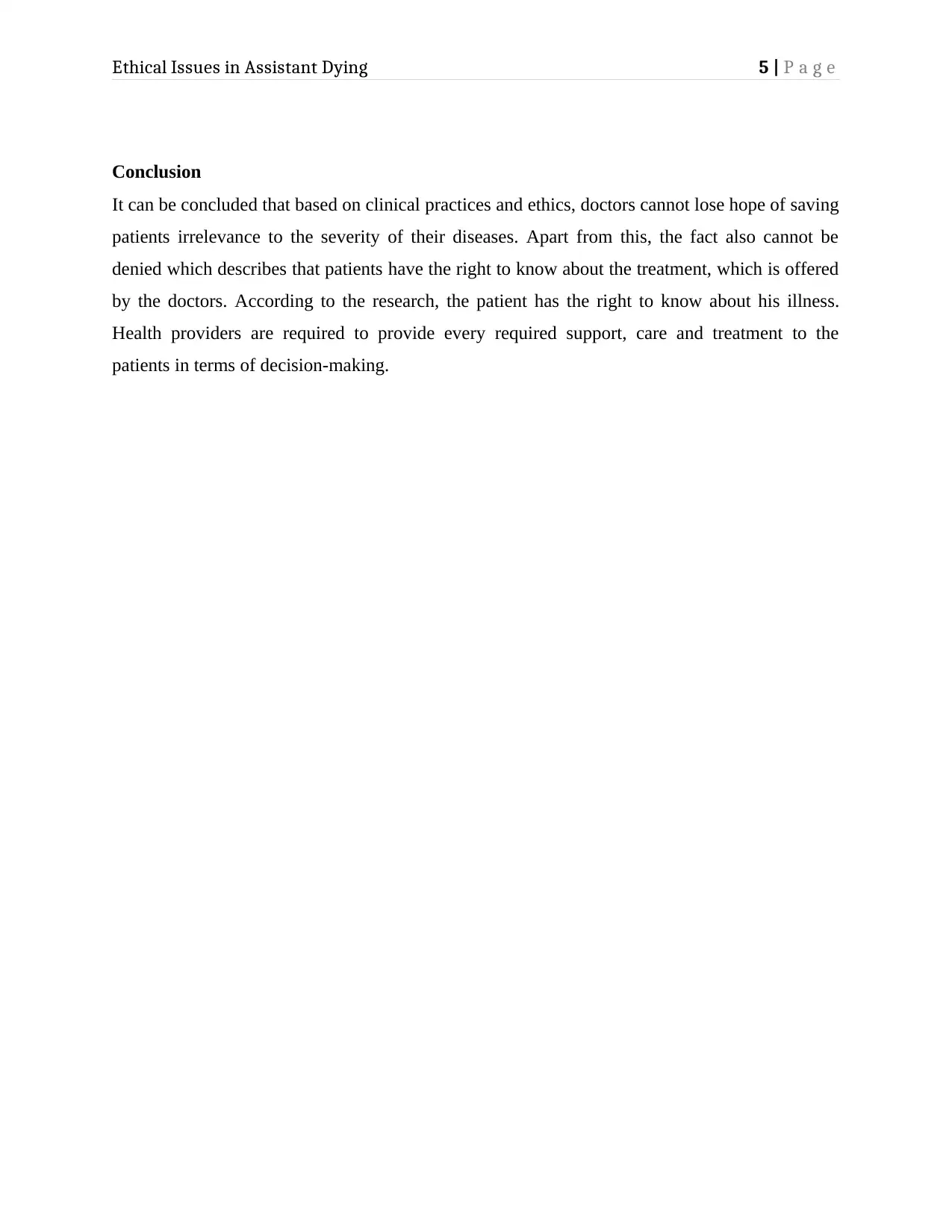
Ethical Issues in Assistant Dying 5 | P a g e
Conclusion
It can be concluded that based on clinical practices and ethics, doctors cannot lose hope of saving
patients irrelevance to the severity of their diseases. Apart from this, the fact also cannot be
denied which describes that patients have the right to know about the treatment, which is offered
by the doctors. According to the research, the patient has the right to know about his illness.
Health providers are required to provide every required support, care and treatment to the
patients in terms of decision-making.
Conclusion
It can be concluded that based on clinical practices and ethics, doctors cannot lose hope of saving
patients irrelevance to the severity of their diseases. Apart from this, the fact also cannot be
denied which describes that patients have the right to know about the treatment, which is offered
by the doctors. According to the research, the patient has the right to know about his illness.
Health providers are required to provide every required support, care and treatment to the
patients in terms of decision-making.
⊘ This is a preview!⊘
Do you want full access?
Subscribe today to unlock all pages.

Trusted by 1+ million students worldwide
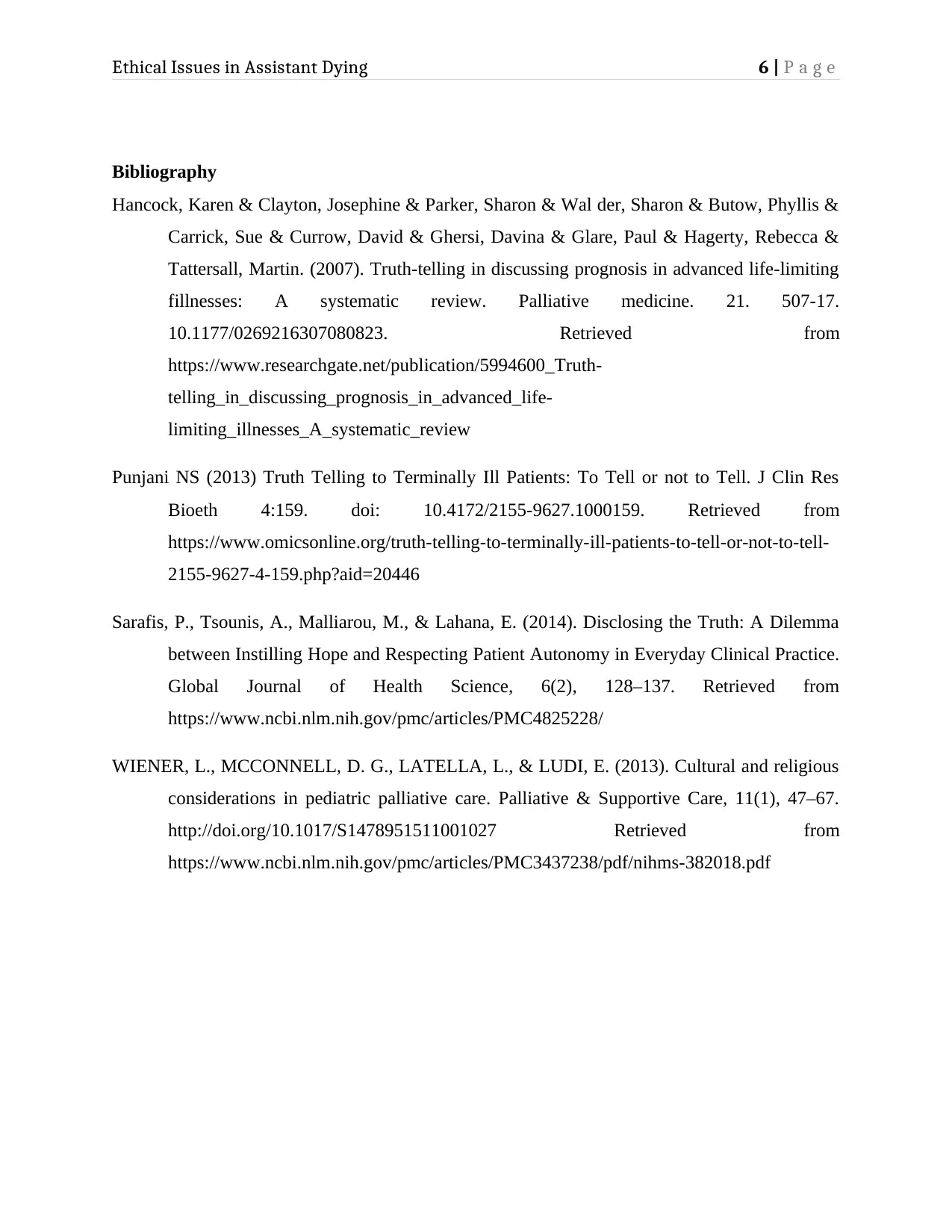
Ethical Issues in Assistant Dying 6 | P a g e
Bibliography
Hancock, Karen & Clayton, Josephine & Parker, Sharon & Wal der, Sharon & Butow, Phyllis &
Carrick, Sue & Currow, David & Ghersi, Davina & Glare, Paul & Hagerty, Rebecca &
Tattersall, Martin. (2007). Truth-telling in discussing prognosis in advanced life-limiting
fillnesses: A systematic review. Palliative medicine. 21. 507-17.
10.1177/0269216307080823. Retrieved from
https://www.researchgate.net/publication/5994600_Truth-
telling_in_discussing_prognosis_in_advanced_life-
limiting_illnesses_A_systematic_review
Punjani NS (2013) Truth Telling to Terminally Ill Patients: To Tell or not to Tell. J Clin Res
Bioeth 4:159. doi: 10.4172/2155-9627.1000159. Retrieved from
https://www.omicsonline.org/truth-telling-to-terminally-ill-patients-to-tell-or-not-to-tell-
2155-9627-4-159.php?aid=20446
Sarafis, P., Tsounis, A., Malliarou, M., & Lahana, E. (2014). Disclosing the Truth: A Dilemma
between Instilling Hope and Respecting Patient Autonomy in Everyday Clinical Practice.
Global Journal of Health Science, 6(2), 128–137. Retrieved from
https://www.ncbi.nlm.nih.gov/pmc/articles/PMC4825228/
WIENER, L., MCCONNELL, D. G., LATELLA, L., & LUDI, E. (2013). Cultural and religious
considerations in pediatric palliative care. Palliative & Supportive Care, 11(1), 47–67.
http://doi.org/10.1017/S1478951511001027 Retrieved from
https://www.ncbi.nlm.nih.gov/pmc/articles/PMC3437238/pdf/nihms-382018.pdf
Bibliography
Hancock, Karen & Clayton, Josephine & Parker, Sharon & Wal der, Sharon & Butow, Phyllis &
Carrick, Sue & Currow, David & Ghersi, Davina & Glare, Paul & Hagerty, Rebecca &
Tattersall, Martin. (2007). Truth-telling in discussing prognosis in advanced life-limiting
fillnesses: A systematic review. Palliative medicine. 21. 507-17.
10.1177/0269216307080823. Retrieved from
https://www.researchgate.net/publication/5994600_Truth-
telling_in_discussing_prognosis_in_advanced_life-
limiting_illnesses_A_systematic_review
Punjani NS (2013) Truth Telling to Terminally Ill Patients: To Tell or not to Tell. J Clin Res
Bioeth 4:159. doi: 10.4172/2155-9627.1000159. Retrieved from
https://www.omicsonline.org/truth-telling-to-terminally-ill-patients-to-tell-or-not-to-tell-
2155-9627-4-159.php?aid=20446
Sarafis, P., Tsounis, A., Malliarou, M., & Lahana, E. (2014). Disclosing the Truth: A Dilemma
between Instilling Hope and Respecting Patient Autonomy in Everyday Clinical Practice.
Global Journal of Health Science, 6(2), 128–137. Retrieved from
https://www.ncbi.nlm.nih.gov/pmc/articles/PMC4825228/
WIENER, L., MCCONNELL, D. G., LATELLA, L., & LUDI, E. (2013). Cultural and religious
considerations in pediatric palliative care. Palliative & Supportive Care, 11(1), 47–67.
http://doi.org/10.1017/S1478951511001027 Retrieved from
https://www.ncbi.nlm.nih.gov/pmc/articles/PMC3437238/pdf/nihms-382018.pdf
1 out of 7
Related Documents
Your All-in-One AI-Powered Toolkit for Academic Success.
+13062052269
info@desklib.com
Available 24*7 on WhatsApp / Email
![[object Object]](/_next/static/media/star-bottom.7253800d.svg)
Unlock your academic potential
Copyright © 2020–2026 A2Z Services. All Rights Reserved. Developed and managed by ZUCOL.





